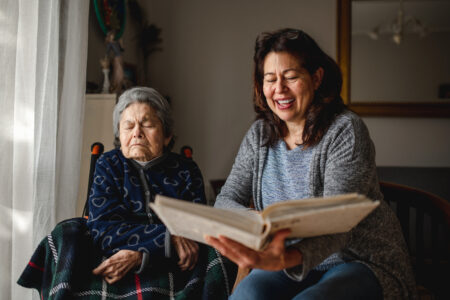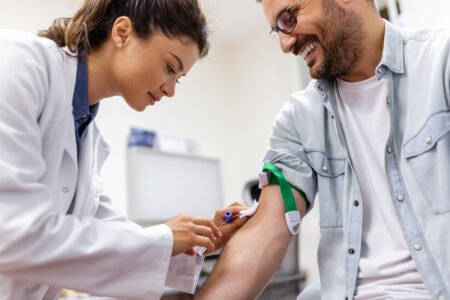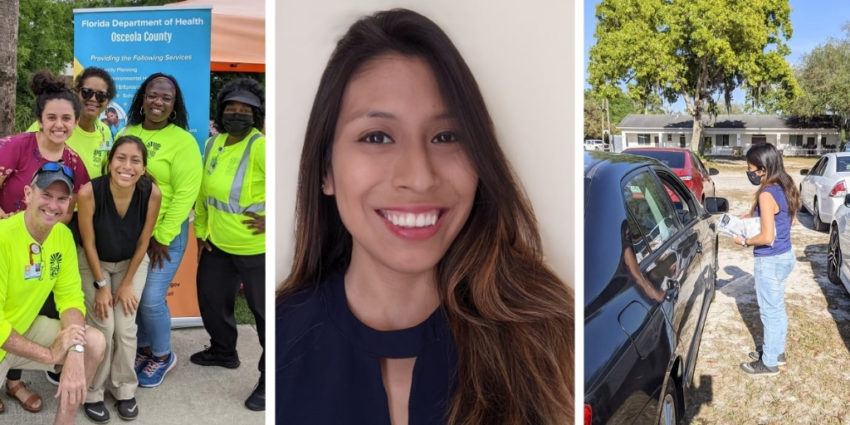
Share On Social!
Why did Emelina Asto-Flores volunteer for a clinical trial to test a COVID-19 vaccine?
Asto-Flores, a community health educator in Florida, saw how the pandemic devastated Latinos, and she decided to enroll in the trial to help her people.
Not only did she help researchers make sure the vaccine is safe for Latinos, but the trial also gave her the knowledge and confidence to encourage others to get their shot.
“Representation is important in a clinical trial,” Asto-Flores said.
“You wouldn’t want a clinical trial to be just consisted of one group. These results need to be proportionate to our diverse communities. It’s so important for us as members of the [Latino] community to take that leadership role that could save lives. So those that are a part of that can say, ‘Hey, these results care representative of my community.’”
Experiencing a Pandemic, Asto-Flores Got the Urge to Help Latinos
As word, as well as the virus itself, began spreading across the globe in early 2020, Asto-Flores knew, thanks to her health sciences education, that the coronavirus would harm people’s health in the United States.
When the virus did arrive here, fears began to circulate in her mind.
“Initially, I thought it was going to hit us hard because I have a public health background,” she said. “I understood that once an outbreak occurs, it’s going to end up coming to the United States, eventually. So, I was worrisome about that. I was worried about the loss of my family members, my grandmother and mother. Learning about the COVID-19 statistics and how it affects those who tend to be older. My main concern was for them.”
Unfortunately, Asto-Flores did experience some COVID-19 hardship.
Despite being young, her cousin caught COVID-19. She had a severe enough case to be hospitalized for treatment. Latino youth are especially impacted by COVID-19.
This sparked Asto-Flores’ desire to help those working to stop the spread of coronavirus. 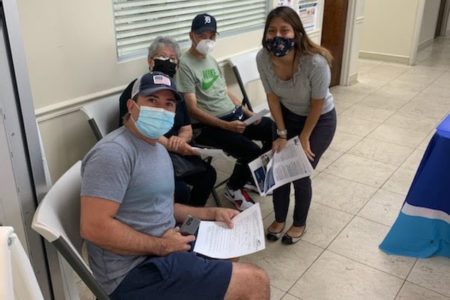
She looked for and found a clinical trial—a research study that helps researchers create effective treatments, or better understand illnesses—for a COVID-19 vaccine.
“I wanted to see if there was something that I could do to help speed up the development of these vaccines,” Asto-Flores said. “That’s why I enrolled in the clinical trials because I could help [experts] gather enough data to see whether the vaccine is sufficient or not.”
Historically, Latinos have been underrepresented in clinical trials due to linguistic barriers, lack of culturally sensitive providers, and socioeconomic disparities.
Without Latino volunteers for trials, the benefits may miss this group.
Hoping to push back against this reality, Asto-Flores was happy to step up for her community.
“I get to represent my community in these clinical trials,” she said. “Knowing that allowed me to service these scientists because these clinical trials need to have diversity. It has to be a good representation of our population in America.”
Finding and Participating in a COVID-19 Vaccine Clinical Trial
Asto-Flores found out about a COVID-19 vaccine trial through a career fair newsletter.
She had been looking for a full-time position after her graduation from the University of Florida, where she had also worked as a community health educator.
After confirming the trial’s validity—a critically important step for those looking to participate in clinical trials, according to Asto-Flores—she contacted the trial’s coordinators about participation. She then began the process to enroll as a participant.
After signing up, Asto-Flores came to the trial faculty for pre-screening.
During this screening, clinical trial leaders go over all the aspects of the trial, including reviewing the Institutional Review Boards (IRB), which protects the rights and welfare of people recruited to participate in research activities.
“Reviewing the IRB is really important,” she said. “They had someone knowledgeable about the study sit with me and explain everything to me verbally. What the study was about. There were 32 pages to review. It described everything that the study was about.” 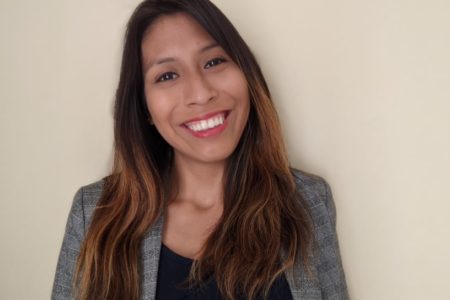
Asto-Flores then gave her approval to participate.
“I actually really like that process because it ensures that you’re actually reading what you’re committing towards life is very important,” she said. “So I expected the IRB to be discussed with me. I also expected to have someone there to answer my questions.
After that, as a volunteer in the trial, she was given a dose of the COVID-19 vaccine. Following that first shot, she was monitored for an hour to look for any immediate issues that might arise. Since then, and after receiving her second shot through the trial, Asto-Flores returns to the trial facility for routine exams and bloodwork.
Moreover, researchers will continue to monitor her over the next two years.
Reflecting on and Urging Others to Participate in Clinical Trials
For Asto-Flores, one of the best parts best part of participating was getting to see just how safe these trials were.
One standout fact she likes to share is that people who volunteer in clinical trials are “never forced to stay part of these trials.” This and other areas of freedom gave her the security to play a role in the development of the vaccine.
“I think it’s something very important that people should know,” she said. “That they’re the ones who get to say, ‘I feel comfortable,’ or ‘I don’t feel uncomfortable.’ I think that’s the major part — that you get to choose to participate or not.”
Other recommendations she provides include:
- Make sure that you feel comfortable signing up
- Make sure that the place you’re signing up is in a good location for you
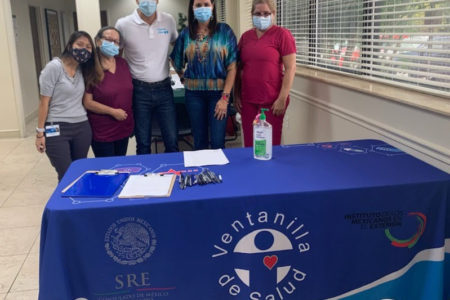
- Make sure that you know everything about the trial and that you’re given a copy of the IRB
- Always remember to reach out to the location where you signed up if you have any questions
“I participated in this trial because I wanted to represent my community — the Latino community,” Asto-Flores said.
How Can You Get Involved in Clinical Trials
You can be like Emelina Asto-Flores!
We need Latino volunteers for clinical trials because it helps researchers create treatments and solutions tailored for this population.
Dr. Amelie Ramirez, leader of Salud America! at UT Health San Antonio, is creating new ways to encourage Latinos to volunteer for cancer and Alzheimer’s clinical trials. This work is supported by a grant from Genentech, a member of the Roche Group.
“Latinos in clinical trial s are not only helping themselves, they are building a future with better treatments that can help their families and communities in the future,” Ramirez said.
If you’re in San Antonio, volunteer for:
- A cancer clinical trial at the Mays Cancer Center at UT Health San Antonio: https://salud.to/maystrials
- An Alzheimer’s disease clinical trial at the Glenn Biggs Institute for Alzheimer’s and Neurodegenerative Diseases at UT Health San Antonio: https://salud.to/biggstrials
You can also use the National Cancer Institute’s online search tool or call 1-800-4-CANCER to find a cancer clinical trial in your area!
Explore More:
Clinical TrialsBy The Numbers
142
Percent
Expected rise in Latino cancer cases in coming years
This success story was produced by Salud America! with support from the Robert Wood Johnson Foundation.
The stories are intended for educational and informative purposes. References to specific policymakers, individuals, schools, policies, or companies have been included solely to advance these purposes and do not constitute an endorsement, sponsorship, or recommendation. Stories are based on and told by real community members and are the opinions and views of the individuals whose stories are told. Organization and activities described were not supported by Salud America! or the Robert Wood Johnson Foundation and do not necessarily represent the views of Salud America! or the Robert Wood Johnson Foundation.

